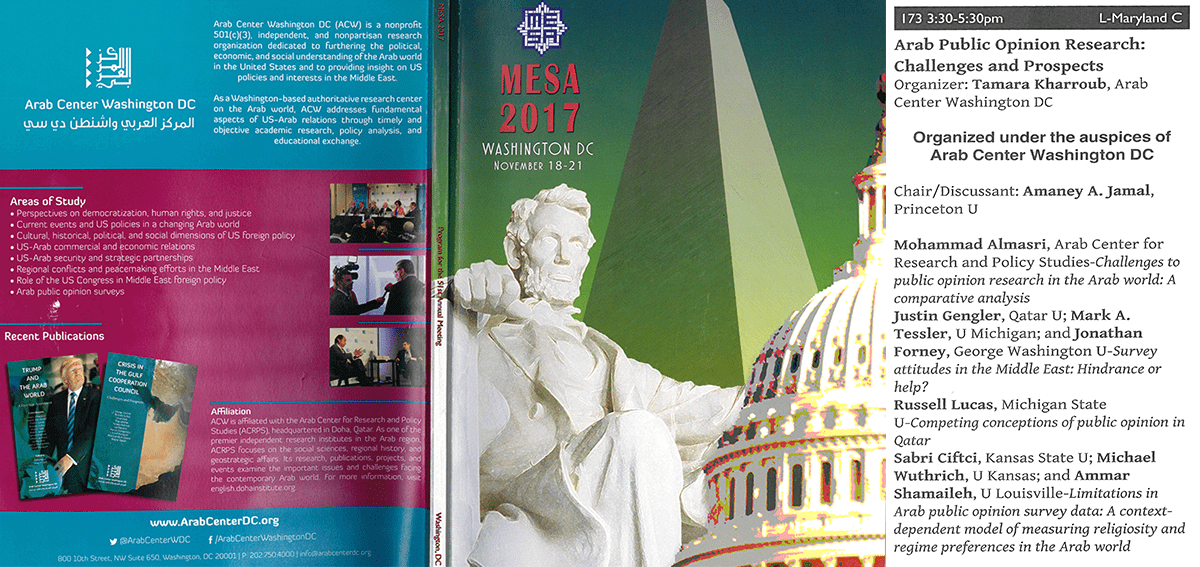
Washington, DC – November 20, 2017: Arab Center Washington DC (ACW) organized a panel at the annual conference of the Middle East Studies Association (MESA), an academic association that fosters high standards of scholarship and teaching in the study of the Middle East.
The ACW panel, titled “Arab public opinion research: Challenges and prospects”, was among the few proposals accepted for presentation at MESA through a competitive blind peer-review process. With 3000 individual members, more than 60 institutional members, and 39 affiliated organizations worldwide, MESA’s 2017 annual meeting, which took place in Washington DC, attracted close to 2000 Middle East scholars from around the world.
Given the importance and evolution of the study of Arab public opinion, the ACW panel focused on critically and systematically assessing the perceptions, challenges, and shortcomings of Arab public opinion research and providing conceptual and methodological solutions. The panel represented the first platform to provide a critical discussion of Arab public opinion research, addressing challenges to data collection, analysis, and interpretation, as well as thematic limitations.
In the opening introduction to the panel, Assistant Executive Director and Senior Analyst at Arab Center Washington DC Tamara Kharroub stressed the importance of Arab public opinion research for ACW’s mission in providing Arab perspectives and evidence-based analysis to US policy-making. In fact, the most recent poll conducted by ACW surveyed Arab perceptions of President Donald Trump and assessment of his Middle East policies and priorities.
Kharroub emphasized that despite a boom in public opinion research by scholars, private firms, and government agencies throughout the Arab world especially after September 11, “surveys are scarce, methodologies not uniform, country differences not accounted for, and interpretation and explanation of data still inadequate.” ACW organized this panel because “there remains an intense debate over the validity, significance, and interpretation of Arab opinion polls.” This area of research remains largely understudied and is deserving of more attention within Middle East studies disciplines, Kharroub said.
The panel featured scholars of public opinion research in the Arab world, who presented research paper on the topic. Mohammad Almasri and Dana El Kurd from Arab Center for Research and Policy Studies (ACRPS) in Doha discussed the extensive experience they have and the challenges the faced working on the Arab Opinion Index and presented new models and indices they developed to overcome these challenges. Launched in 2011 by ACRPS, the Arab Opinion Index annually and systematically measures Arab public opinion on a variety of issues of interest to the Arab masses through conducting polls with tens of thousands of respondents in more than 12 Arab countries each year. This annual effort produces the largest known report on public attitudes throughout the Arab region on political, social and cultural issues. Unlike other similar surveys of public opinion on a comparable scale, the Arab Opinion Index is firmly rooted in the region and is based on the priorities of the Arab societies.
Justin Gengler (Qatar University), Mark Tessler (University of Michigan), and Jonathan Forney (Forcier Consulting) presented their quantitative study of whether survey attitudes in the Middle East are a hindrance or help, while Russell Lucas of Michigan State University discussed the competing conceptions of public opinion in Qatar. Sabri Ciftci (Kansas State University), F. Michael Wuthrich (University of Kansas), and Ammar Shamaileh (University of Louisville) presented their paper on the limitations in Arab opinion data, and provided a context-dependent model of measuring religiosity and regime preferences in the region. Amaney Jamal of Princeton University and member of ACW’s Academic Advisory Board acted as discussant and provided commentary on the presentations. The panel was very well attended and received.
As an independent non-profit research center focusing on the study of the Middle East, Arab Center Washington DC is committed to organizing such panels that promote academic exchange and foster quality research in the field.
